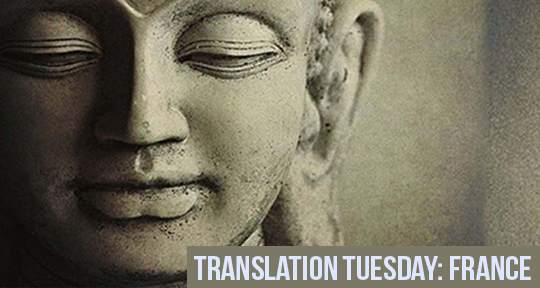This week’s Translation Tuesday presents a chilling and challenging poem by Jules Boissière, translated from the Occitan. At turns uncomfortable to read yet undeniably skilful in its imagery and structure, the poem’s deft enjambment and linguistic precision belies the speaker’s cultural ignorance (e.g., the suggestion that the Buddha is revered as a god) and his complicity in colonial terror. It’s admittedly difficult to make sense of the colonizer’s mindset, which at once mourns a seemingly indifferent universe while confirming the wolfish volition of his compatriot soldiers.
Also noteworthy is the poet’s insistence on writing in Occitan rather than French. Writes translator A.Z. Foreman: “It is only in Occitan that Boissière allows himself to be honest about life as a colonial soldier. This poem gives a soldiers’-eye view of terrorized civilians running for their lives from a home in flames, followed by a macabre meditation. We are more accustomed to poetry that describes the effect of brutality on those who suffer from it. This poem, though, conveys the effect on a man who inflicts it. The coarsening of the mind, brought on by acceptance of the horrific.”
The Buddha
Our soldiers won, then torched a domicile.
The owner with his sons ran half a mile
Under gunfire. On the ancestors’ altar
Not guarding the old creeds or their old shelter,
The Buddha gave our wolfish men a smile.
How many hours has it been since? Where now
Is that house? Where’s the pudgy god whose brow
And smile are signs of fate’s indifferent law?
When man beneath mute Heaven prays or cries,
I see again that Buddha’s ruddy jaw,
His moonlike face, and his too tranquil eyes.
Translated from the Occitan by A.Z. Foreman
Jules Boissière (Juli Boïssièra) was born in 1863, and wrote poetry in French and Occitan. In 1886 he joined the French army and was deployed to Hanoi, part of the recently consolidated territory of French Indo-China. He served in the 11th Alpine Infantry Battalion, and saw combat in some of the last few battles to conquer the Tonkinese countryside, before beginning his tenure in the French administrative corps in Saigon and Huế where he learned the language today known as Vietnamese, acquired at least a basic knowledge of Classical Chinese, and cultivated the fondness for opium for which he was to become notorious. He served a long post in Bình Định before returning to France to marry Thérèse Roumanille, daughter of Joseph Roumanille the patriarch of the Provençal Félibre movement. Boissière returned to Tonkin with his wife in 1892, taking stewardship of the Revue Indochinoise. After another leave of absence in 1895, he was promoted to Vice-Resident 1st Class and died a painful intestinal death two years later.
A.Z. Foreman is a literary translator, finance translator, language teacher, and soon-to-be PhD student in Near Eastern Languages. He received his B.A. in Linguistics from the University of Chicago, and his M.A. in Arabic language from the University of Maryland. His translations from Arabic, Russian, Old English, Welsh, and Classical Chinese have appeared in anthologies, journals, and one BBC radio broadcast. He divides his time between the bedroom, the bathroom, and the kitchen.
*****
Read more translations on the Asymptote blog:

